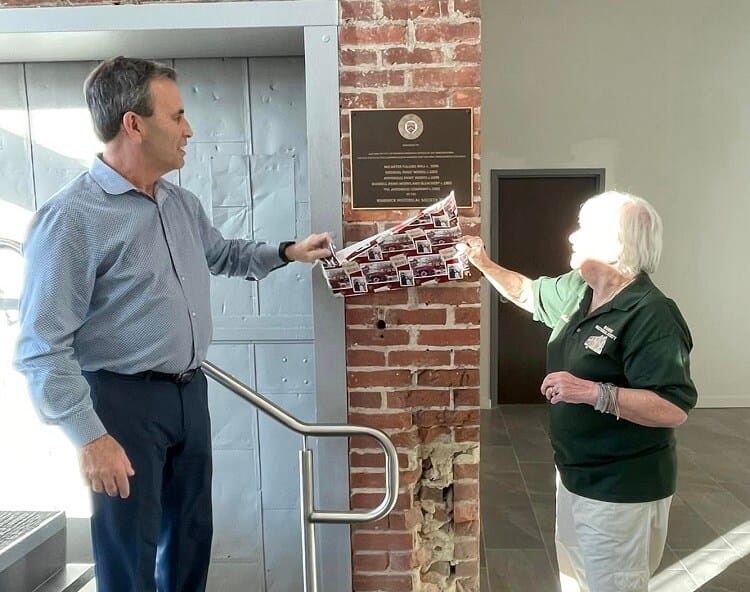

Moves like relocating city offices to the Apponaug Sawtooth building have increased Mayor Frank Picozzi’s popularity, but his handling of former Councilman Steve Merolla’s city pension and benefits could puncture the mayor’s otherwise positive image.
To support that image, Picozzi didn’t need to look too far for examples where his predecessors failed to adequately address important city functions: Broken garbage trucks, worn out fire apparatus, city buildings too flood-damaged for use, schools so neglected that they need several hundred million dollars to repair.
These were highly visible problems that Picozzi quickly and directly addressed — and touted heavily, to the local press and his followers on social media.
As would be expected, Picozzi enjoyed greater popularity and favorable responses from his audience, to the point that he collected the highest number of votes in Warwick in 2022, even though he ran unopposed.

With that kind of populist backing, it would be natural for Picozzi to think he’d earned freer rein to root out apparent malpractice and improprieties.
But his recent announcement about pursuing former Councilman Steven Merolla for two years of city health benefits may turn out to be a costly misstep for Picozzi — and this time, his popularity may not have any influence on the outcome.
First, it’s helpful to answer a few questions about the situation, including how the dispute about Merolla’s eligibility arose.
How did Merolla qualify for a city pension and health coverage?
As Picozzi acknowledged in his press release, Merolla qualified for a city pension and health coverage because he was elected and served at least three terms on the city council prior to before February, 2009.
That date is important because Chapter 48-117 of the Warwick Code of Ordinances, which Picozzi cited in his announcement, took effect on Feb. 19, 2009 and ended the practice of elected officials being eligible for retirement benefits from the city as of that date.
Importantly, Ch. 48-117 does not otherwise speak to eligibility, which is where the issue gets more complex — and, potentially, more politically fraught for Picozzi.
How did Merolla collect retirement benefits from the city?
Merolla told WarwickPost.com that he discussed his application with Personnel Director Steven Rotondo in Feb. 2021. Rotondo then submitted Merolla’s application to the Warwick Retirement Board, which approved it at its meeting on March 18, 2021.
Following that, Merolla said he received paperwork confirming the benefits, signed by city hall and retirement board officials — including two members appointed by Picozzi following his election in 2020.
[Membership on the retirement board is governed by City Code of Ordinances Section 6-311, with the majority of seats reserved for city administrators and members and retirees of city unions. Four other seats are appointed by the mayor for three-year terms.]
Shortly after, Merolla started receiving $236.82 in monthly pension payments and half the cost of a family healthcare plan. Picozzi has valued the healthcare benefits at almost $44,000 over two years.
Why is Picozzi saying Merolla wasn’t eligible?
According to his press release, Picozzi claims that Merolla was not eligible for early retirement health benefits because ordinances and policies created after 2009 forbid the practice.
Picozzi specifically cited a 2018 letter to Merolla that said he would be eligible for health benefits at 60, not 55.
But Merolla explained that Rotondo said he was “grandfathered in” to the city benefit plan and could apply for early retirement, making the letter irrelevant.
What are the chances of getting restitution from Merolla?
This is where the issue gets thorny for Picozzi, since he needs to prove Merolla’s responsibility for, as the mayor portrayed it, “receiving medical coverage from the city to which he was not entitled.”
A couple of factors that complicate such a claim, though, are that Picozzi blamed city personnel department staffers for approving Merolla’s application, and explained that he “never said” Merolla received the funds fraudulently.
The admission of the city’s fault, along with the apparent concession that Merolla didn’t commit fraud, effectively take away two legal avenues that Picozzi could pursue — potentially hurting his ability to recoup any of the funds.
And, ultimately, that’s the key issue here: Whether Picozzi could prevail in a court case against Merolla.
What legal issues could come up in a court case?
For his part, the mayor said “the law” obliges him to seek restitution, but an actual legal case wouldn’t be that straightforward — and there’s a good chance the result could be the opposite of what Picozzi is seeking.
In simple terms, Picozzi would need a court to rule that Merolla should repay the city for money and benefits that he wasn’t eligible to get, and reject Merolla’s statements that he received guidance and approval from the city saying otherwise.
Dissecting those potential arguments further, Picozzi would need to prove that, as mayor, he has the authority to overrule a retirement board decision, cancel someone’s pension and healthcare coverage, and seek restitution for what is, by his own admission, an error by the city.
For his part, Merolla could point to language in the charter that sets up the retirement board and outlines its authority in arguing that the mayor doesn’t have those powers, like Code of Ordinances Section 6-312 that gives the board “exclusive original jurisdiction in all matters relating to or affecting the [city’s retirement] funds.”
That phrase — “exclusive original jurisdiction” — is a critical piece of legalese, because it’s the kind of language that typically determines how a court establishes which government entity has what role in a particular situation.
A court could rule that once the retirement board voted to approve Merolla’s payments, the decision was effectively made and city hall staffers were required to carry it out.
Another potential issue is whether the retirement board actually approved healthcare coverage along with the pension — and whether Picozzi could have their decision overturned by proving that health insurance wasn’t included in Merolla’s application.
With Merolla saying (and presumably being able to show) that the documents approved by the city included medical coverage, Picozzi’s prospects for succeeding on this front look pretty dim.
What are the possible complications for Picozzi?
As with any court case, there are a number of pitfalls for the city if Picozzi isn’t successful.
For example, a court could decide that the retirement board — not Picozzi — has the last word on city pensions and benefits, and order Picozzi to file an appeal of Merolla’s benefits with the board while the city is still paying them.
A court could also support Merolla’s contention that it was the city’s responsibility to know what policies governed his application when the personnel department approved it, and that the approval creates a legally binding contract that the city is required to uphold.
In either of these situations, the city would lose the case, could be held liable to pay Merolla’s legal fees, and may face the prospect of an expensive countersuit.
Beyond the practical consequences, though, such a defeat would put a significant dent in Picozzi’s well-crafted image of the businessman who is fighting to change how city hall works.
Rushing headlong into a complex situation and seeking to hold others accountable for how the city personnel department functioned under him are less the hallmarks of a savvy business person and more the signs of a political novice trying to force their version of a situation to come true.
And in truth, Picozzi had other options for what to do after learning of Merolla’s pension and medical benefits — like communicating with Merolla directly before issuing a hasty (and vague) press release that required another few days (and several more questions from WarwickPost.com) to clarify.
Picozzi may have worried that such a move would open him to accusations of “making a backroom deal,” which would be especially ironic if the city eventually seeks to settle the matter out of court.
Conclusion: Making thinly-veiled accusations against a former councilman, only to undercut those accusations with his own later statements, make it seem like Picozzi is more concerned about optics than outcomes in the Merolla pension case — and that could end up costing the city more than if Picozzi had tried a less-publicized way of addressing the situation.
This is a test
